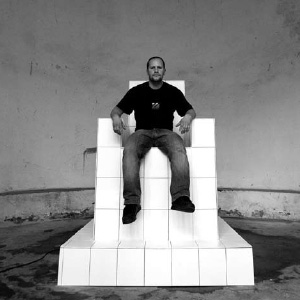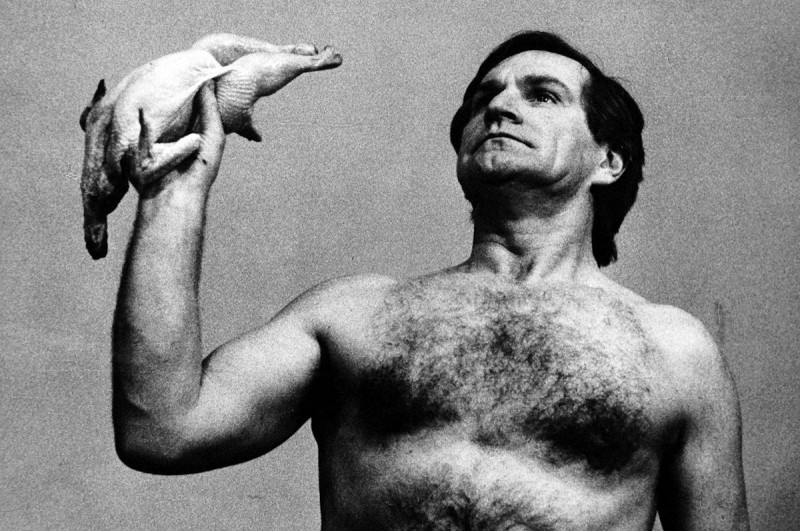Polish Avant Garde Cinema: STRUCTURES OF THE ABSURD
Wednesday, October 12
7:30pm
GrayDUCK Gallery
2213 E Cesar Chavez St, Austin, TX 78702
$7 general / $5 students, seniors
Experimental Response Cinema welcomes Polish filmmaker Kamila Kuc, who will present a program of short avant garde films from Poland. The program is a selection of the historical and recent works of two leading Polish experimental filmmakers and conceptual artists, Józef Robakowski and Marcin Mierzicki. Their films deal largely with the constructed nature of the cinematic image and the role of performance within it. Both filmmakers’ favor simple, DIY methods of filmmaking. The necessity for both filmmakers to free themselves from narrative structures, as well as their attention to absurd in the everyday, are the guiding principles of this program.
program of her own films at the Austin Polish Film Festival later in the week (October 15 at the AFS Cinema).
INTRODUCTION: 10 mins

PROGRAM RUNNING TIME: 50 mins (all files are digital)
From my window (Z mojego okna, Józef Robakowski, 1978/85, 16 mm and video, 18′)
Shot over the period of twenty-something years from a 9th floor window of the filmmaker’s apartment, this piece merges fact with fiction. We see snippets of street life (market square) and the film has often been shown with a live commentary, often reinvented for the purpose of new screenings. The later parts of the film, shot on video throughout the 1980s constitute a critique of the ideological uses of the communist TV.
Sick Building Syndrome (Syndrom chorego budynku, Marcin Mierzicki, 2011, HD, 5’25)
The large part of the film depicts a burning building, shot from a window of the filmmaker’s apartment. A man in a lift performs absurd poses. Sick Building Syndrome is about being trapped in interiors with ‘hidden’ defects.
Nearer – further (Bliżej – dalej, Józef Robakowski, 1985, 16mm, 3’36)
Reminiscent of Michael Snow’s Back and Forth (1969, US) and John Smith’s Girl Chewing Gum (1976, UK) in this piece Robakowski directs the camera to zoom back and forth. The film reflects the filmmaker’s interest in the constructed nature of a cinematic image and the agency of a machine as an extension of human (artistic) expression.
Untitled (Bez tytułu, Marcin Mierzicki, 2003, HI8, 3’09)
Untitled was made during a solar eclipse. People are depicted staring at the sky through different objects (floppy discs) tensely waiting for something to happen. Perhaps aliens will descend.
Cinema is Power! (Kino to Potęga!, Józef Robakowski, 1985, video, 7’22)
The artist re-edited images of a Soviet army parade in Red Square in Moscow to construct a mockery of mechanically repeated ideological slogans. Edited to a powerful soundtrack of the Slovenian rock band Laibach the film deconstructs the ritualistic power of ideologically loaded authoritarian TV transmissions.
The Farm (Farma, Marcin Mierzicki, 1999, DV, 1’)
The Farm is a trailer for an unmade film. Like many of Mierzicki’s video work, the piece was made as a comment on absurd and often pointless human behavioural patterns. The Farm invites the questioning of the purpose of any action performed.
Oh, my leg is hurting (Ojej, boli mnie noga, Józef Robakowski, 1990, video, 3’)
Characteristically to Robakowski’s work, this film is a one take. Oh My, My Leg is Hurting is filmed from a point of view of the person who is walking while complaining about a hurting leg. Like the Futurists, Robakowski often compares human body to mechanical media, thus transferring the agency of making a film to the apparatus itself.
Dynamic persuasion (Perswazja dynamiczna, Marcin Mierzicki, 1998, HI8, 3’54)
This absurdist piece is the filmmaker’s first video made during his studies of painting and sculpture at the Arts Academy in Wroclaw. Dynamic persuasion is a performance piece in which an actor imitates the movements of a Japanese fighter. The footage of his performance is intercut with a Japanese samurai film.
I Stay at Home and do Nothing Special (Siedzę w domu i nie robię nic szczególnego, Marcin Mierzicki, 2013, HD, 5’08)
It’s an intimate performance in which a man performs pointless repetitive actions, such as folding clothes and putting them in plastic bin bags. Although nothing seemingly happens, the piece has a built-in tension. The ending can mean an escape, or a catastrophe of sorts.
BIOGRAPHICAL NOTES
Józef Robakowski (b.1939, Poznan, Poland) is a conceptual artist, art historian, photographer and experimental filmmaker. Robakowski is a curator and owner of the Exchange Gallery in Lodz. He studied art history and museology at the Arts Academy in Torun and cinematography at the famous Film School in Lodz, where he is now in charge of multimedia workshops. Robakowski was a co-founder of such important artistic formations as EYE (1960) and Film Form Workshop (1970).
Marcin Mierzicki (b.1973, Lublin, Poland) is a graduate of the Department of Painting and Sculpture of the Fine Arts Academy in Wroclaw. Mierzicki began his career as a painter but eventually moved towards sculpture, installation and experimental film. His interests evolve around the materiality of media and his installations (many of which involve sound) are often site-specific. He is the recipient of numerous scholarships and awards, most recently from the Ministry of Culture and National Heritage.
Kamila Kuc, Ph.D. (b.1981, Wroclaw, Poland) is an art and film historian, experimental filmmaker and curator. Her work reflects her interest in how film as a technology of memory can be seen as an innovative creator of memories themselves. Kuc is the 2016 Artist in Residence at Basement Films, Albuquerque, New Mexico, USA. She is the recipient of numerous international grants, most recently British Council. Kuc has curated works of numerous international experimental filmmakers (Laura Mulvey, Józef Robakowski, John Smith). She is a co-editor (with Michael O’Pray) of The Struggle for Form: Perspectives on Polish Avant-Garde Film, 2014, 1916-1989 (Columbia University Press, 2014). Her monograph The Promises of Avant-Garde Film is forthcoming with Indiana University Press. She is currently a Director of Media Production Studies (BA) at Coventry University
 .
.
